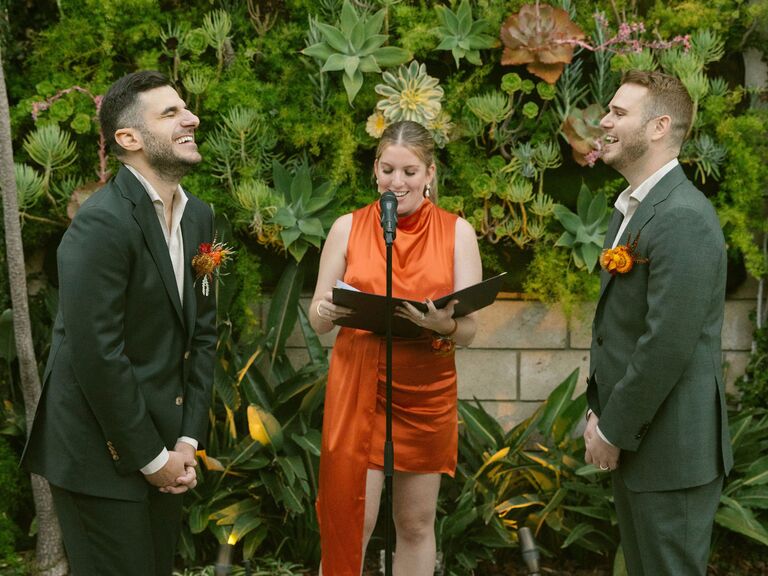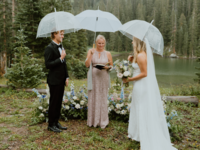23 Questions Your Officiant Will Probably Ask You (So Get Those Answers Ready)

Whether you're still looking for the perfect officiant or you've landed on just the right person to guide you through your vows, there's going to come a time when the tables are turned and the officiant questions a couple on all the nitty gritty elements of their big day. These questions aren't just to check off a box—the officiant wants to make sure they're the right fit for your ceremony, and they want to help guide you towards a ceremony that will flow smoothly for both you and your guests.
"Officiating a wedding is a tremendous honor and challenge, and you do not want to say 'yes' to officiating the wedding unless you feel ready for the commitment, and you also want to make sure the ceremony and vision aligns not only with the couple's expectations, but also with what you are able to give," explains Steven Greitzer, officiant coach, CEO and founder of Provenance.
From being prepared to run through the type of service you have in mind to delivering remarks that suit who you are as a couple, the officiant wants to have a full understanding of the questions. Going into that meeting prepared can help all of you get aligned, whether you've already agreed to plan the wedding together or you're still in the decision-making process. Here are 23 questions experts suggest you put on your radar so you'll know what to expect when the officiant puts you in the hot seat.
1. How did you meet?
An officiant should first get to know you two! To deliver a personalized ceremony, it's important for them to understand how you met, whether you two had a whirlwind courtship or spent years as friends, and how you popped the question. They want to know your favorite way to spend a Tuesday night together or whether you have honeymoon plans. Give them a glimpse into what makes you two unique.
2. What are you most excited about for your big day? What is your vision of your perfect day?
Carolyn Holmes, celebrant at Rites of Way, notes that a good officiant will want to understand exactly what your vision is of your big day. Are you most excited for the butterflies of the processional? The moment when you exchange rings? A unity ceremony or other tradition? Your officiant wants to understand what matters most to you as a couple so they can help plan the ceremony accordingly.
3. Will your guests be seated during the ceremony?
Nargess Tabrizy-Shokrani, wedding planner and owner of Fleur de Lis Events, says that officiants will want to get a feel for whether the couple's vision of the length of the ceremony aligns with how they'll have their guests situated. "It's a good idea to take the length of the program into account so they're not standing for an uncomfortable length of time."
4. What does the officiant time commitment look like?
It should be expected that your officiant is there for the rehearsal dinner—it would be hard to rehearse without them! But Greitzer says that officiants will often ask what the full time commitment looks like to make sure they're on the same page. "What is the date and time of the ceremony? What time should the officiant be at the venue, and for how long? Will the officiant lead the rehearsal? It's important to be on the same page around these expectations," explains Greitzer.
5. What do you want your guests to say about your ceremony after the fact?
"If you and your guests are writing a review after the ceremony, what would you want it to say?," asks Eleanor Willock, independent celebrant at the Full Stop Celebrant. She uses this to spark conversation with potential couples and get a feel for what they want out of the ceremony. This helps her understand what they're looking for, and it helps the couple decide if she's the right professional officiant for their ceremony.
6. Are you available to meet for planning sessions?
Planning a ceremony requires time and effort—and it's not all on the officiant! They want to make sure you're ready to show up and communicate your vision. Greitzer explains, "There are a lot of elements that go into crafting a ceremony, and you want to touch base a few times throughout the planning process so you are not meeting your couple for the first time on the big day." Some officiants will require premarital counseling as well, another time commitment.
7. Will the ceremony be held outdoors?
Weather, sun and rain will impact your officiant just as much as they'll impact your wedding day. "If it's outdoors, the officiant will want to take into account sunlight and direction of the sun for everyone involved," says Tabrizy-Shokrani.
8. If there's music, who's going to cue it?
Tabrizy-Shokrani explains, "It's best to have someone — whether a wedding planner or family member — cue the musician or play audio at the start of the ceremony." The officiant doesn't want to be responsible for both the music and marrying you, so they'll make sure you have someone else stepping into that role.
9. Will you provide a microphone or will there be any AV available for the ceremony?
"Ideally, you should have a microphone available to ensure guests can hear clearly," says Tabrizy-Shokrani. While some officiants may come with the venue, those that are hired externally will need to make sure all of the AV details are in place.
10. What do you want the officiant to wear?
Even if it's a religious ceremony, this shouldn't be left up to chance! Look through photos of other weddings and get an idea of what you envision for your officiant. "Don't believe a couple if they say "wear whatever you want!" The officiant will be in some of the most important photos of their lives; they are going to care, they just haven't realized it yet," says Greitzer.
11. What's your plan to get legally married?
Sometimes a ceremony is purely symbolic and the couple is actually tying the knot at a different time and place. But Greitzer suggests the officiant touch base to make sure the couple understands the legalities. He says, "Check the requirements for the county where they are getting married, which is not necessarily where they are living at that moment. Confirm you can legally marry them." If you can't, communicate that with them ahead of time so they don't end up scrambling on the morning of the big day, wondering how they'll turn this into a legal marriage before grandma finds out.
12. Are there any special announcements to be shared before the ceremony officially begins?
Want a cell phone free wedding? Need to tell guests where to go for a cocktail as soon as the ceremony ends? Your officiant will want a list of these announcements ahead of time so they can seamlessly work them into the script.
13. Are there any deceased loved ones to acknowledge?
"Find out if there are any family, friends or pets who have passed that the couple wants to acknowledge. If so, the officiant may ask if you'd like to honor them with a moment of silence or in another way," says Greitzer. This can be a heartwarming addition to a ceremony, but the officiant will want to know beforehand so they can include it in a way that feels natural and warm.
14. Do you have a marriage license?
You can't get married without a marriage license, and, while the officiant can't apply for you, they should ask you if you have one. After all, they've been through this process more times than the couple—and it can be a confusing process! Micaela Beltran, cofounder at Courtly, explains, "It's not the officiant's responsibility to apply for the license, just to ensure that the couple has it with them at the ceremony. Marriage licenses will require biographical details and sometimes a signature, so couples should fill up the application themselves." She notes that most licenses expire after 30 to 60 days.
15. Have you thought of any readings you would like to include? Would you like any help with choosing these?
Most people don't put together ceremonies on a regular basis, so it can be intimidating to choose readings that symbolize your entire relationships in just a few hundred words. Luckily, the officiant has been through this a few times before, and they can help guide you towards meaningful options to choose from.
16. How many people are you expecting to be at your wedding ceremony? Is there anything I need to know about family dynamics?
In addition to understanding how big the audience is, the officiant also wants to know what the unique family dynamics are and how they might impact the ceremony. This could affect everything from their delivery of stories to how they acknowledge the parents of the couple—and they won't know unless you tell them.
17. Are there any traditions you want to incorporate from either or both of your backgrounds?
Greitzer explains that an officiant will want to explore how the couple wants to incorporate traditions, like a candle lighting or ring warming, and whether those will be left as-is or adapted for a more modern take. They'll also want to make sure they feel educated and comfortable with performing the religious traditions of the couple.
He says there are countless secular, cultural and religious rituals to choose from, and the officiant can help the couple adapt this to their vision, whether that includes quotes from The Princess Bride or a Taylor Swift lyric hidden like an Easter egg within the script.
18. Will you be incorporating your own vows?
An officiant will want to know up front whether you'll write your own vows since this will impact their own script throughout the ceremony. As soon as you have an idea on the length of your vows, decide who will go first. Think about how you want the officiant to prompt you to start. They want to help you feel comfortable, so give them all the information they need.
19. How should we recite the declaration of intent?
This is the section of the ceremony where the couple traditionally says their "I do's". "There are traditional examples, as well as more modern ones," explains Greitzer. Don't assume there's one way to do it. Ask the officiant for a few examples, then tell them explicitly how you want it to go. Also, let them know if there's anything that you want to update or change from the traditional language.
20. Who will have the rings?
The officiant needs to be ready to cue the right person to walk up with the rings at the right moment. Make sure they know who to look for so the bands of gold make their way to your fingers without a hitch.
21. How would you like to be announced at the end of the ceremony?
The officiant wants to make sure you start your married life with the right name! Whether you're taking the same last name, keeping your own, making a new last name or just want first names as you exit the ceremony, it's up to you—but the officiant needs to know which it is.
22. What's your budget?
While some officiants may work on a donation basis, others have a standard rate. If they're being asked to travel, then that will be factored into the costs. It's best to get everyone on the same page from day one, and the officiant will ask your budget up front to understand if this is the right fit.
23. What don't you want?
"Often, we find it easier when faced with a very open ended and scarily momentous event to plan, to say what we don't want. So we build from there," says Willock. Once she understands what a couple absolutely doesn't want to see on their big day, she has the freedom to creatively figure out what they do want.




















